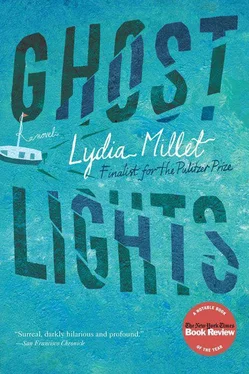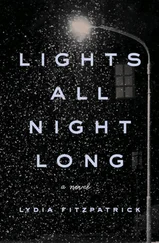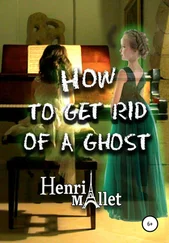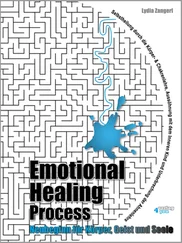Lydia Millet - Ghost Lights
Здесь есть возможность читать онлайн «Lydia Millet - Ghost Lights» весь текст электронной книги совершенно бесплатно (целиком полную версию без сокращений). В некоторых случаях можно слушать аудио, скачать через торрент в формате fb2 и присутствует краткое содержание. Издательство: W. W. Norton & Company, Жанр: Современная проза, на английском языке. Описание произведения, (предисловие) а так же отзывы посетителей доступны на портале библиотеки ЛибКат.
- Название:Ghost Lights
- Автор:
- Издательство:W. W. Norton & Company
- Жанр:
- Год:неизвестен
- ISBN:нет данных
- Рейтинг книги:5 / 5. Голосов: 1
-
Избранное:Добавить в избранное
- Отзывы:
-
Ваша оценка:
- 100
- 1
- 2
- 3
- 4
- 5
Ghost Lights: краткое содержание, описание и аннотация
Предлагаем к чтению аннотацию, описание, краткое содержание или предисловие (зависит от того, что написал сам автор книги «Ghost Lights»). Если вы не нашли необходимую информацию о книге — напишите в комментариях, мы постараемся отыскать её.
How the Dead Dream
Ghost Lights
Ghost Lights
Ghost Lights — читать онлайн бесплатно полную книгу (весь текст) целиком
Ниже представлен текст книги, разбитый по страницам. Система сохранения места последней прочитанной страницы, позволяет с удобством читать онлайн бесплатно книгу «Ghost Lights», без необходимости каждый раз заново искать на чём Вы остановились. Поставьте закладку, и сможете в любой момент перейти на страницу, на которой закончили чтение.
Интервал:
Закладка:
The case was closed, but he had hammered on the bulletproof glass door.
Hal made a gentle case for public roads — a gentle and inoffensive case, he felt — but still the libertarian looked at him through narrowed eyes as though he were a damnable liar.
“The way I see it, the tax system is what gives us our freedoms. The freedom to move, for starters. I mean, what would happen if every man had to build his own roads? Or if every single mile of road was a toll? You could try looking at it that way.”
The libertarian’s narrowed eyes were already glazing over. Tax protesters liked to talk, often, but once someone else took a turn at talking they felt a nap coming on.
Roads were easy as a soapbox because no citizen could cling to the belief that roads were built for free. On the roads where they drove they felt free, of course — they drew in a sweet breath of independence and let it out again happily. Americans loved to drive, discovered in driving both a splendid isolation and the shimmering mirage of connectedness.
But how did they come to drive on those roads, those slick long roads that gave a view of mountains or valleys, of suburbs or cities? They paid for their vehicles, of course. Hal had never yet met a protester who believed the cars themselves should be free, handed out like candy at Halloween to all and sundry from a benevolent car-giving source. A typical protester did not blame car manufacturers for charging money, for he held private enterprise in high esteem. He blamed the government for charging for its myriad services, but private operators could rob him blind in broad daylight, all in the name of liberty.
Hal’s own father had been wary of government programs. Possibly this was why Hal had an affection for libertarians, albeit patronizing. Most of them had a chip on their shoulders, a heavy chip. It was as though, when they were young, a schoolyard bully had terrorized them, and in the memory of that bully an idea of Big Government had come to be encoded.
But government is only a bully, he liked to tell them, when it needs to be for the common welfare. . crime was another arena where government took a stern and paternal hand, and most tax protesters did not mind this a bit. When it came to crime — a matter far more serious, in the eyes of your average protester, than say education or poverty — protesters were all about government. Also they had no argument with the government when it came to the commissioning, manufacture and deployment of vast arrays of weapons, both conventional and nuclear.
According to your typical tax protester the potential oblivion of all things living was rightly the province of government, but not so a measly ten- or fifteen-percent garnishment of their salary.
It was not the mandate of the Service, of course, to psychoanalyze or proselytize. It was not the purview of the Service to take taxpayers under its wing and baby them. It was the task of the Service simply to evaluate, assess and finally collect. But Hal often chose to engage personally despite the fact that, under the law, he was not required to do so or even, frankly, encouraged.
In truth, no matter what facts and figures he marshaled to defend government, the protesters were never converted. Simply, they cherished their right to direct fear and loathing at government bureaucracy. It was a God-given right, and one they insisted on exercising to the fullest. All he could give them, in the end, was an impression of having been listened to and reasoned with. Though they stoutly resisted reason — it was another God-given right to be unreasonable, indeed to hate reason almost as much as they despised government — they might not forget that he had made them a cup of coffee.
“Let me get you some coffee,” he said to the libertarian, who was jiggling one foot. “Milk? All we have is that powdered dairy creamer.”
While he was in the hallway pouring the coffee the libertarian might notice the pictures on his desk, of Susan in a dress and Casey in her wheelchair. Casey hated the picture and accused him of pandering, but he genuinely loved it and in any case could not bear to have earlier pictures of her around.
His coworker Linda came up behind him at the coffeemaker. Her large round earrings were like Christmas tree ornaments. “Hal,” she said, reaching for a tea bag, “the papers room is a mess. Where are the 433-D’s?”
“New stack,” he said. “Beside the obsolete forms? Second shelf. On your left.”
Protesters often rejected reason without even pinning down what it was they rejected, he thought as he tapped in the dairy creamer. They understood in the most nebulous terms the difference between argument and debate, or even raw unquestioning instinct and rigorous logic. Finally what they cherished most, he thought — and he made these generalizations only after decades of service — was their relationship not to morality or individualism but to symbols.
The symbols had about them an aura of immanence, and to the symbols many protesters cleaved. It was often not one symbol for them but many — say a flag, say an eagle, say a cross; say a pair of crossed swords. The symbols were richly pregnant, pregnant with a meaning that would never be born.
It never needed to be.
Against a symbol there could be no argument.
“Here you go,” he said, in his office again, and handed over the coffee mug.
•
His colleagues in general were not believers like him but cynics. They were cynical about their jobs and cynical about the tax code; they were cynics about human nature and about civil service. Indeed his own deep convictions on the subject of taxes and government would likely have been objects of their ridicule if not for the fact that, due to Casey’s paralysis, he often got a free pass on everything.
And it wasn’t simple pity either. Everyone came to know illness in the course of their lives, everyone came to know death, and somewhere within this grim terrain was the situation of Casey, Susan and him — a situation in which people beheld the inverse of their own good fortune. In Casey they saw a lamb on the altar: there others suffered for their sin. If they did not believe in sin they tended to be superstitious at least, believing her affliction filled some kind of ambient bad-luck quota that might otherwise have to be filled by them.
He reorganized a taxpayer file idly. The dog had slept at the foot of the bed last night, where she’d whined until lifted, and left short white hairs all over the red quilt. He did not like these hairs but he had liked the feel of the dog on his feet while he was falling asleep. In the morning, as he was pouring coffee into his travel mug before leaving, Susan had called Casey from the wall phone in the kitchen. “We have his dog,” he heard his wife say, watching the dog lap at her new water bowl, and then, “No. Still nothing.”
A knock on his office door.
“Come in,” he said.
It was Rodriguez, who wore his pants belted high.
“Hey, man,” said Rodriguez.
“Hey.”
Often a single habit of an otherwise unremarkable person, such as wearing high-waisted pants, struck Hal as tragic.
“So you coming to lunch? It’s Linda’s fiftieth.”
“Fiftieth,” said Hal. “Whoa.”
With the pants tightly cinched right below his rib cage, Rodriguez limited his options. Figuratively speaking, Rodriguez shot himself in the foot every time he got dressed.
“Who woulda known, right? She doesn’t look a day over sixty-five,” said Rodriguez, and laughed nervously.
“Thanks for thinking of me. I have an appointment with my daughter at lunchtime, though,” said Hal regretfully. It was his standard excuse, but in this case a lie and thus in need of fleshing out to have the ring of truth. “She’s in the market for a new car. I have to go with her to a dealership to talk about conversion. You know — hand controls, wheelchair loader. You’d be surprised how many of those mobility-equipment folks try to rip off paraplegics.”
Читать дальшеИнтервал:
Закладка:
Похожие книги на «Ghost Lights»
Представляем Вашему вниманию похожие книги на «Ghost Lights» списком для выбора. Мы отобрали схожую по названию и смыслу литературу в надежде предоставить читателям больше вариантов отыскать новые, интересные, ещё непрочитанные произведения.
Обсуждение, отзывы о книге «Ghost Lights» и просто собственные мнения читателей. Оставьте ваши комментарии, напишите, что Вы думаете о произведении, его смысле или главных героях. Укажите что конкретно понравилось, а что нет, и почему Вы так считаете.












